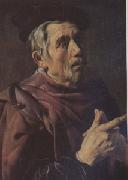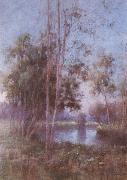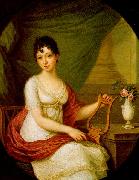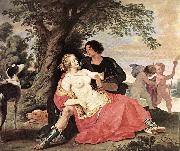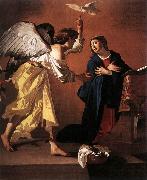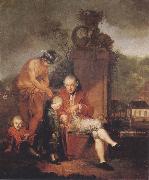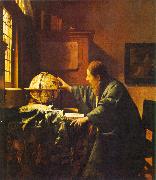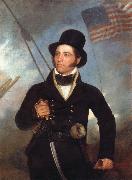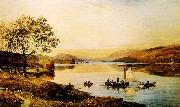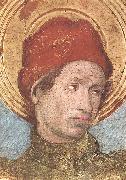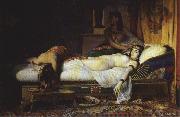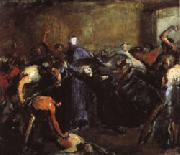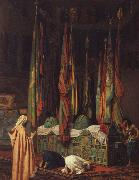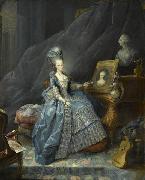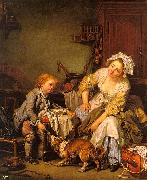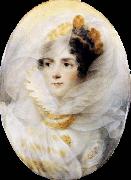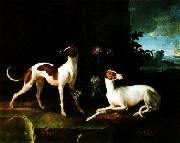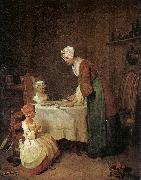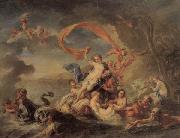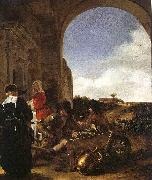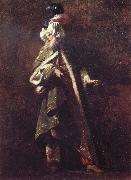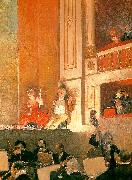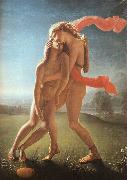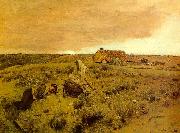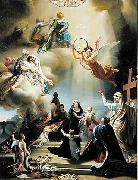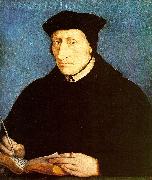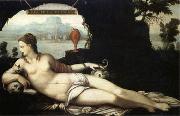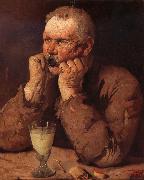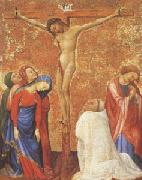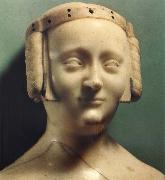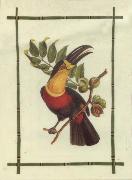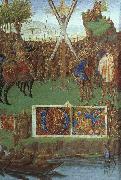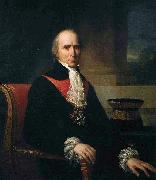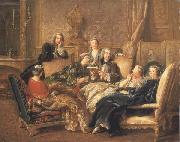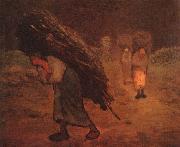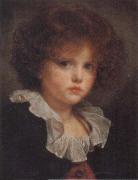|
|
|
|
|
|
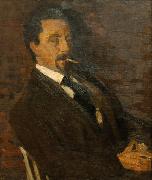 |
Janis Rozentals
|
|
(March 18, 1866, Bebri Farmstead, Saldus parish, Courland Governorate - December 26, 1916) was a Latvian painter.
Rozentels received the basic education at H.Krause's Elementary School in Saldus and Kuldega District School. At the age of fifteen the boy left for Riga and consistently tried to realize his dream about art, later entering St.Petersburg Academy of Art. During study vacations the developing artist visited his native land to relax from the hectic rhythm of the large city, paint motifs from nature and commissioned portraits. For his diploma work he took as models the young educated Latvians and local farmers. A little later the artist decided to settle in Saldus as he wanted to live among his people and create art appropriate to its aspirations and feelings. In spring 1899 Rozentels bought a building plot at the Striķu street and set up a studio, but his intents were not well received in the provincial town and he moved to Riga two years later. Now a memorial museum is arranged in the building designed by the artist. Fateful turn in life of the painter happened in November, 1902, when Janis Rozentels got acquainted with Elli Forsell(1871 - 1943), a Finnish singer, in Riga. On February 20, 1903, they got married. They found home in a flat- studio, in Alberta street, in Riga. they had three children - Laila, Irja and Miķelis. World War I interrupted the family's life in Riga and in 1915 they relocated to Finland. He died suddenly on December 26, 1916 and was buried in Helsinki, though later was reburied in his homeland. Today, the Janis Rozentels Art Highschool in Riga is named after him, and has had his name since 1946. |
|
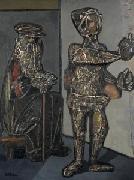 |
Jankel Adler
|
|
(July 26, 1895 ?C April 25, 1949) was a Polish painter and printmaker.
He was born as the seventh of ten children in Tuszyn, a suburb of Ł??dź. In 1912 he began training as an engraver with his uncle in Belgrade. He moved in 1914 to Germany where he lived for a time with his sister in Barmen. There he studied at the college of arts and crafts with professor Gustav Wiethecher.
From 1918-1919 he went back to Ł??dź, where he was joint founder of a group of avant-garde artists. In 1920 he returned briefly to Berlin; in 1921 he returned to Barmen, and in 1922 he moved to Desseldorf. There he became a teacher at the Academy of Arts, and became acquainted with Paul Klee, who influenced his work. A painting by Adler received a gold medal at the exhibition German art Desseldorf in 1928.
In 1929 and 1930 he went on study trips in Mallorca and other places in Spain. During the election campaign of July 1932 he published with a group of leftist artists and intellectuals an urgent appeal against the policy of the National Socialists and for communism. As a modern artist, and especially as a Jew, he faced persecution under Hitler's regime which took power in 1933. |
|
|
|
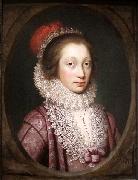 |
Janssens van Ceulen
|
|
Cornelis Janssens van Ceulen (also Cornelius Jonson van Ceulen, Cornelius Johnson, Cornelis Jansz. van Ceulen and many other variants) (bapt. October 14, 1593, London - bur. August 5, 1661, Utrecht) was an English painter of portraits of Dutch or Flemish parentage. He has been described as "one of the most gifted and prolific portrait painters practising in England during the 1620s and 1630s".
|
|
|
|
|
|
|
|
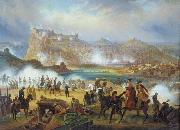 |
January Suchodolski
|
|
(September 19, 1797 - March 20, 1875) was a Polish painter and Army officer.
Suchodolski was born in Grodno and was the brother of Rajnold Suchodolski.
From 1832 to 1837 Suchodolski studied in Rome, where he was a pupil of Horace Vernet. Suchodolski became known for his history and battle paintings.
He died in Bojmie (near Siedlce).
|
|
|
|
|
|
|
|
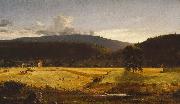 |
Jasper Francis Cropsey
|
|
(February 18, 1823 - April 23, 1900) was an important American landscape artist of the Hudson River School.
Cropsey was born on his father Jacob Rezeau Cropsey's farm in Rossville on Staten Island, New York, the oldest of eight children. As a young boy, Cropsey had recurring periods of poor health. While absent from school, Cropsey taught himself to draw. His early drawings included architectural sketches and landscapes drawn on notepads and in the margins of his schoolbooks.
Trained as an architect, he set up his own office in 1843. Cropsey studied watercolor and life drawing at the National Academy of Design under the instruction of Edward Maury and first exhibited there in 1844. A year later he was elected an associate member and turned exclusively to landscape painting; shortly after he was featured in an exhibition entitled "Italian Compositions."
Cropsey married Maria Cooley in May 1847, traveled in Europe from 1847-1849, visiting England, France, Switzerland, and Italy. He was elected a full member of the Academy in 1851. Cropsey was a personal friend of Henry Tappan, the president of the University of Michigan from 1852 to 1863. At Tappan's invitation, he traveled to Ann Arbor in 1855 and produced two paintings, one of the Detroit Observatory, and a landscape of the campus. He went abroad again in 1855, and resided seven years in London, sending his pictures to the Royal Academy and to the International exhibition of 1862.
Returning home, he opened a studio in New York and specialized in autumnal landscape paintings of the northeastern United States, often idealized and with vivid colors. Cropsey co-founded, with ten fellow artists, the American Society of Painters in Water Colors in 1866. He resided in the City until 1885, when he removed to Hastings-on-Hudson.
The monument of Jasper Francis Cropsey in Sleepy Hollow CemeteryCropsey's home and studio, Ever Rest, in Hastings-on-Hudson, New York as well as the largest permanent collection of Cropsey's work are open for tours by the Newington-Cropsey Foundation.
Jasper Cropsey died in anonymity but was rediscovered by galleries and collectors in the 1960s. Today, Cropsey's paintings are found in most major American museums, including the National Gallery of Art, the Metropolitan Museum of Art, the Los Angeles County Museum of Art, the Detroit Institute of Arts, the Timken Museum of Art in San Diego, the Honolulu Academy of Arts, the Fine Arts Museums of San Francisco, the Denver Art Museum, and the Museum of Fine Arts, Boston. Works by Cropsey also hang in the White House. |
|
|
|
|
|
|
|
|
|
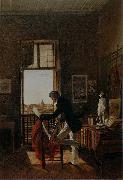 |
Jean Alaux
|
|
(1785 - 2 March 1864) was a French history painter and Director of the French Academy in Rome from 1846-52.
Alaux was born in Bordeaux, the son of a painter, and the second of four brothers who were all themselves painters. he received his first lessons in art from his father, but went on to formal training with Pierre Lacour, then Pierre-Narcisse Guerin. He was admitted to the École des Beaux-Arts in Paris in 1807. From 1808 he entered works for the Prix de Rome but his energies were diverted when his elder brother, Jean-Francois Alaux (1783-1858), asked him to help with a large "neorama" (a type of Panorama) he was working on. Jean eventually won the Prix de Rome's first prize in 1815, with a work entitled "Briseis weeping over the body of Patroclus", a scene inspired by The Iliad of Homer. He subsequently became a pensionnaire at the French Academy in Rome from 1816 to 1820 (later becoming its director). |
|
|
|
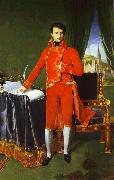 |
Jean Auguste Dominique Ingres
|
|
J. A. D. Ingres (1780-1867) was born in Montauban on August 29, 1780, the son of an unsuccessful sculptor and painter. |
|
|
|
|
|
|
|
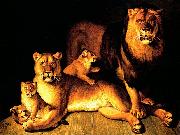 |
Jean Baptiste Huet
|
|
(Paris, 15 October 1745-Paris, 27 January 1811) was a French painter, engraver and designer associated with pastoral and genre scenes of animals in the Rococo manner, influenced by François Boucher.
Born into a family of artistse his uncle was Christophe Huet, his father Nicolas Huetehe apprenticed with the animal painter Charles Dagomer, a member of the painters' guild, the Academie de Saint-Luc, Paris, who was working in the 1760s. Huet's interest in printmaking and his acquaintance with Gilles Demarteau, who later engraved many of his compositions, both date from this period. About 1764 Huet entered the studio of Jean-Baptiste Le Prince, where he further developed his printmaking skills, largely reproducing his own paintings, a method of publishing them with some profit.
In 1768 he was approved by the Academie Royale, and 29 July 1769 he was received (reçu) in the minor category (petite maniere) of painter of animals and was well received in the public reviews when he began to exhibit at the Paris Salon that same year, with a Dog Attacking Geese, now at the Louvre. He continued to exhibit annually until 1789, through his attempts at the grand manner of history painting, considered the noblest genre, were not met with approval. |
|
|
|
|
|
|
|
|
|
|
|
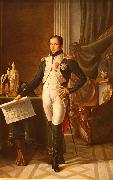 |
Jean Baptiste Wicar
|
|
Jean-Baptiste Wicar (22 January 1762, Lille - 27 February 1834, Rome) was a French Neoclassical painter and art collector.
The son of a carpenter, Wicar studied drawing at the free school in Lille before further honing his talents in the studio of David. The drawings Wicar created of Tableaux, statues, bas-reliefs et camees de la Galerie de Florence et du palais Pitti (Paintings, statues, bas-reliefs and cameos in the Gallery of Florence and the Pitti Palace) were published in Paris in 4 volumes at the Lacombe publishing house from 1789 to 1807.
Wicar headed the commission set up by Napoleon I of France to loot artworks from the Austrian Netherlands to enrich museums in France - an initial convoy left Antwerp on 11 August 1794, notably with paintings by Rubens, for the Louvre. Abbeys and castles were systematically emptied of their contents, furniture and works of art. Wicar was also a member of the commission des sciences et des arts on the Italian campaign, in the entourage of Bonaparte. This commission was charged with seizing artworks that could enrich French national museum collections. He finally permanently settled in Rome in 1800 and became a portraitist of European renown.
On his death in Rome, Wicar left the major collection of 1,300 drawings he had accumulated over his lifetime to the Societe des Sciences, de leAgriculture et des Arts de Lille. Mostly from the Italian school, but also in some small measure from the northern schools, it held drawings by artists like Raphael, Albrecht Derer, Lucas Cranach, Nicolas Poussin and Jacques-Louis David. |
|
|
|
|
|
|
|
|
|
|
|
|
|
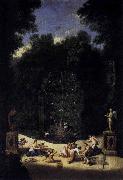 |
Jean Cotelle
|
|
Jean Cotelle
Jean Cotelle, 'the younger', was a painter and engraver, born in Paris in 1645. He received his early instruction from his father, Jean Cotelle, and eventually visited Italy. On his return he devoted himself to his profession, producing historical paintings, miniatures, and occasionally etchings. His chef-d'oeuvre was the 'Marriage at Cana,' painted in 1681 for the cathedral of Notre-Dame. There are by him at Versailles several views in the gardens of that palace. He etched a plate representing 'Our Lord on the Mount of Olives,' and a series of seven scenes from the history of Venus. He was admitted into the Academy in 1672, and died at Villers-sur-Marne in 1708. |
|
|
|
|
|
|
|
|
|
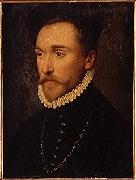 |
Jean Decourt
|
|
Jean de Court, an enamel painter of Limoges, succeeded François Clouet as painter to the king in 1572, and was in turn succeeded by his son, Charles de Court, in 1584 or 1589. Jean de Court painted in 1574 a portrait of Henry III, then Duke of Anjou. |
|
|
|
|
|
|
|
|
|
|
|
|
|
|
|
|







